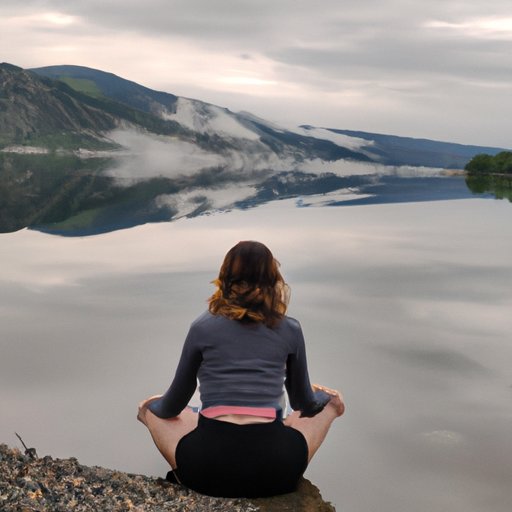Introduction
Being alone can mean different things to different people. For some, it is a necessary part of life, while for others it can be an uncomfortable or even frightening experience. While there is no one-size-fits-all approach to getting used to being alone, there are several strategies that can help. This article will explore ways to adjust to solitude, including taking time to reflect, reconnecting with nature, finding new hobbies, rekindling old interests, and prioritizing self-care.
Taking Time to Reflect
Reflection can be a powerful tool for those who are trying to get used to being alone. Taking time to reflect on one’s thoughts and feelings can help to gain clarity and perspective. It can also be a great way to practice mindfulness and become more aware of the present moment. Additionally, it can help to reduce stress and anxiety levels.
There are many techniques for practicing reflection. Writing in a journal is one of the most popular methods as it allows for an outlet for emotions and ideas. Keeping a gratitude journal is another effective way to practice reflection as it helps to shift focus away from negative thoughts and onto the positives in life. Meditation is also a great tool for reflection and can help to develop the ability to observe and accept thoughts without judgment.
Reconnecting with Nature
Nature has long been known to have a calming effect on the mind and body. Reconnecting with nature is a great way to adjust to being alone as it can help to provide a sense of connection and purpose. Spending time in nature can also help to reduce stress and anxiety levels and increase feelings of wellbeing.
There are many ways to connect with nature. Going for a walk or run outside is a great way to get some fresh air and take in the sights and sounds of the natural world. Gardening is another wonderful way to connect with nature as it can provide a sense of accomplishment and satisfaction. Bird watching, stargazing, and camping are also great activities that can help to foster a sense of connection with the outdoors.
Finding New Hobbies
Finding new hobbies is another great way to adjust to being alone. Having a creative outlet can help to reduce stress and anxiety levels, while also providing an opportunity to learn and grow. Developing new skills and knowledge can also help to boost confidence and self-esteem.
There are plenty of ideas for new hobbies. Painting, sketching, and photography are all great creative outlets. Cooking, baking, and gardening are also wonderful activities that can bring a sense of satisfaction and accomplishment. Other ideas include playing a musical instrument, learning a new language, or exploring a new craft such as knitting or crocheting.
Rekindling Old Interests
For those who already have hobbies or interests, revisiting them can be a great way to adjust to being alone. Taking up an old hobby or interest can help to reignite passion and enthusiasm, while also providing a sense of familiarity and comfort. Additionally, it can be a great way to stay connected to friends and family who may share similar interests.
There are a few strategies for reviving old interests. One way is to find ways to make the activity more interesting or challenging. Another is to look for new opportunities to participate, such as joining a club or attending an event. Finally, connecting with others who share the same interest can be a great way to stay motivated and inspired.
Prioritizing Self-Care
Self-care is an important part of adjusting to being alone. Taking time to focus on one’s physical, mental, and emotional health can help to reduce stress and anxiety levels, while also increasing feelings of wellbeing. Additionally, it can help to foster a sense of self-worth and appreciation.
There are many examples of self-care practices. Eating a balanced diet, exercising regularly, and getting enough sleep are all essential for maintaining physical health. Practicing mindfulness and meditation can help to cultivate emotional health. Taking time for leisure activities such as reading, listening to music, or engaging in creative pursuits can also help to promote mental wellbeing.
Conclusion
Getting used to being alone can be a difficult process, but it is possible with the right strategies and mindset. Taking time to reflect, reconnecting with nature, finding new hobbies, rekindling old interests, and prioritizing self-care can all help to make the transition easier. With patience and dedication, it is possible to find joy and contentment in solitude.
In conclusion, getting used to being alone takes time and effort. However, by taking time to reflect, reconnecting with nature, finding new hobbies, rekindling old interests, and prioritizing self-care, it is possible to find a sense of peace and contentment in solitude.
(Note: Is this article not meeting your expectations? Do you have knowledge or insights to share? Unlock new opportunities and expand your reach by joining our authors team. Click Registration to join us and share your expertise with our readers.)
